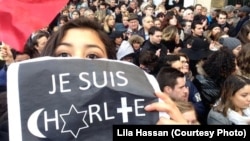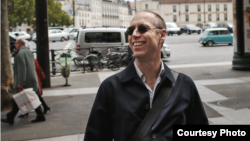On the crowded commuter train that American-born Renee Pontbriand takes to her office near the Eiffel Tower, an unnatural silence set in late last week as a terrorist spree unfolded. "It was spooky," she recalled.
The tower, the Champs-Élysées, Notre Dame – the iconic landscape of Paris remains unchanged. But last week’s two terrorist attacks in and near the city have at least subtly altered the psychological terrain, not only for the French but also for Americans living among them.
Affection for the City of Light has not dimmed among nearly a dozen American Francophiles – educators, students, writers, political activist and faith leaders – interviewed for this story.
"France is so wonderful and so beautiful and so rich," said Pontbriand, a Rhode Island native who has lived in metro Paris for more than half of her 45 years. "People take time to talk to you about things. … You sit around the table for hours talking – with very good food and wine."
She, her French husband and their two children live in the southwestern "satellite city" of Etampes. In a solidarity demonstration there last week, participants sang “La Marseillaise,” Pontbriand said. But when they reached the point in the national anthem "where it says raise your arms, raise your weapons, someone said, 'no, no, you have to be unified.'"
Inured to threats
Pontbriand directs Boston University’s study abroad program in Paris. Fourteen of the semester’s 51 students were in the area when the attacks occurred. The rest of this semester’s class arrived Sunday.
"No students dropped out, no parents called," she said.
"This generation – it’s kind of sad," Pontbriand continued. "They’re almost used to" security alerts and terrorist attacks such as the Boston Marathon bombings in April 2013.
Gilda DiCarli, who was in the BU exchange program and now is a graduate student at the Paris Institute of Political Science (Sciences Po), was home in Boston on winter break when the attacks occurred.
But she felt an immediate connection, she said. Her senior thesis on French satire had included a study of Charlie Hebdo.
DiCarli will return soon to Paris, her home almost steadily since 2012, with increased concern for her own safety and that of a city and country she respects. She said she worries about "cultural repercussions" if government authorities are pressured to impose stricter surveillance and other counterterrorism measures.
The child of Argentine emigrants to the United States, DiCarli has been researching education issues in some of Paris’ immigrant communities.
"Some of the schools are just neglected. The education is supposed to be [about] equality, fraternity and liberty," she said, referencing France’s national motto, "but there really isn’t that equality."
Fighting misperceptions
Another American student, Lila Hassan, is less worried about personal security than the prospect of more misunderstanding.
After last Wednesday’s massacre at the offices of a satirical weekly publication, "my initial reaction was shock," she said. "My second thought was why Charlie Hebdo? I was hoping it wouldn’t be Arabs or Islamists."
Hassan, 20, is a native New Yorker - and a Muslim of Arab descent - who has participated since August in a Queens College, CUNY, student exchange program. She studies political science and journalism at Universite Paris Ouest and works on press freedom issues with the nonprofit Reporters Without Borders.
Though her parents offered to fly her home, Hassan insisted she felt safe. She’d already lived with her family in Cairo and was in Tahir Square in January 2011 as crowds demanded Hosni Mubarek’s removal as Egypt’s president.
"I know Paris isn’t following those same trends. It’s not at risk of revolution that way," she said.
At Sunday’s massive solidarity march at the Place de la Republique, Hassan engaged with other marchers and was encouraged to discover "a lot of them really understand the differences between a practicing Muslim and radicalism. Being here and trying to clarify that in my own way is really important."
Dual-citizen Eileen Horowitz Bastianelli took part in Sunday’s demonstration at the Place de la Republique and in a spontaneous gathering there just a few hours after the Charlie Hebdo attack.
"In the realm of something so tragic, it was extraordinary to see how people have banded together,” said Bastianelli, a native New Yorker who grew up in California and moved to Paris in 1988. "… All of us keep saying, let it last."
The digital media consultant ran social media for Democrats Abroad in 2012 and was disappointed that no top-level U.S. official took part in the Sunday solidarity march.
She called it "a very, very bad representation of my country and my president, who I really believe in."
Bastianelli said she’s concerned about the growing societal fractures – in religious extremism and in the "sharp rise of the far right."
Impact of anti-Semitism
Friday’s attack at the kosher supermarket has stirred discussion of the role of anti-Semitism in the terror spree.
American David Lebovitz, who describes himself as "part Jewish," said friends now ask whether he has encountered anti-Semitism in Paris. "I’ve never had anything happen to me," he said.
A food blogger and author of "My Paris Kitchen," he moved to France from California in 2003. He writes from his apartment, "about a five-minute walk" from the Charlie Hebdo offices.
Though he dislikes crowds, Lebovitz felt compelled to join in Sunday’s big march. "I wanted to be there, because it was a very emotional thing," he said.
The recent terrorism, "caused by extremists who have certain beliefs," hasn’t changed his routine, Lebovitz said.
"But I wonder if it’s going to change in the aftermath," he said. "Is the city going to change? Is the country going to change? Are people’s attitudes going to change?"
Solidarity and separation
Patricia and Walter Wells, journalists who divide their time between Paris and Provence, were having lunch in the south of France when they got a news alert about a mass shooting at a Paris publication.
"First thing, we looked at one another and said, ‘What if it’s the Tribune?’ " said Patricia Wells, a restaurant critic, author and blogger whose husband was the longtime editor of the International Herald Tribune. They had moved to France from New York in 1980.
They live in the capital and Vaison-la-Romaine, a Provencal village of 6,000 where this week at the market "people had signs pinned to their back, ‘Je Suis Charlie,'" Patricia said. She added that Walter had joined in a village unity march Sunday that drew “about 2,000 people. ... I’m really pleased at the solidarity.”
Yet, she said there’s "a tremendous amount of tension" over a growing Muslim presence. She added that, particularly in the schools, “it feels like a powder keg."
The couple runs a cooking school that draws travelers from the United States and elsewhere. Patricia Wells said she doubted their clients would be deterred by the terrorist attacks, though "I think people do feel like this is France’s 9/11."
France is second only to the United Kingdom as a European destination for Americans, according to the U.S. Commerce Department. Tourism accounts for 7 percent of the country’s gross domestic product, Fortune magazine said in a report on terrorism’s potential impact on the industry.
Spiritual refuge
Tourists and ex-pats are among the worshipers at the American Cathedral in Paris, which primarily serves English speakers from the United States, the United Kingdom and Africa.
"We had the [American] Embassy calling to say we’re a soft target," said Lucinda Laird, cathedral dean and rector since March 2013. "So we closed our gates on Wednesday. We’re buzzing people in and out – more to assuage people’s fears."
Even though police killed three Islamic extremists in Friday's twin raids, the country remains at its highest level of security alert.
Over the weekend, Laird led a service naming, and offering prayers for, the three perpetrators as well as their 17 victims. "We’re trying not to respond to hate with hate," said the cleric, raised in New Orleans, Louisiana.
Sunday’s sermon fell to an interim associate priest who’d arrived on New Year’s Eve for a six-month term. Mary Haddad preached about finding a glint of light in a dark time. She spoke from experience: She weathered a 1994 earthquake in Los Angeles and, almost 14 years ago, was at a talk at New York’s Trinity Church when planes hit the neighboring World Trade Center.
"I have the disaster gene," Haddad joked.
Humor aside, she said surviving September 11 "made me calmer. Living through it, you realize there’s September 12. It gives you a perspective. … We have the present moment, which is the only moment that God ever gives us.
"Paris is the same – yesterday, today, tomorrow – this beautiful, magnetic City of Light."







